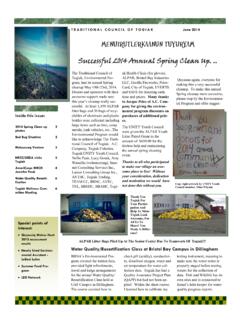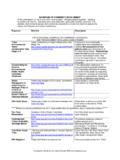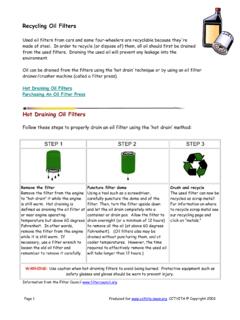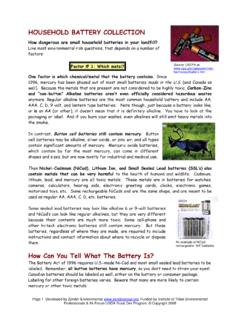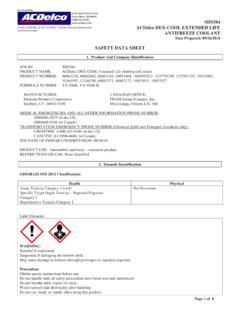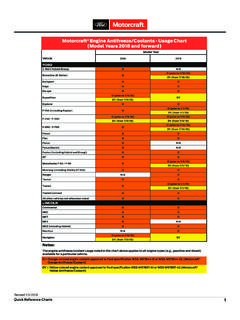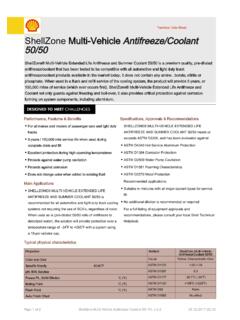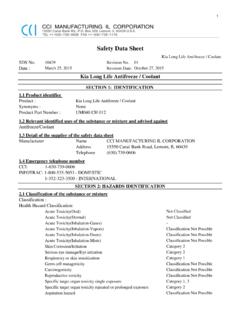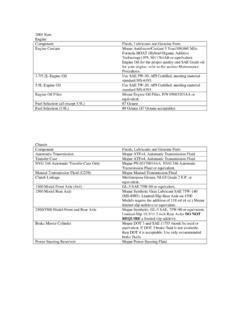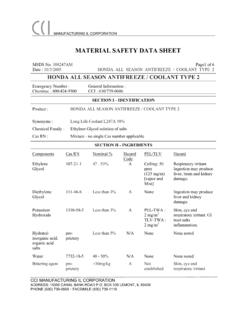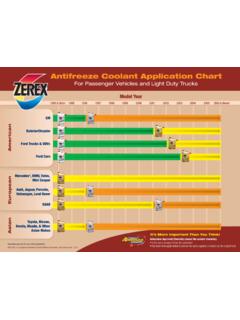Transcription of Antifreeze
1 Page 1 Developed by Zender Environmental Health and Research Group, Copyright 2013 Expanded and updated from original document developed for CCTHITA material is based upon work supported under a grant by the USDA, Rural Development, Rural Utilities Services. Any opinions, findings, and conclusions or recommendations expressed in this material are solely the responsibility of the authors and do not necessarily represent the official views of the Utilities Programs. Antifreeze Used Antifreeze is toxic to humans and animals and should be managed carefully. Disposing used Antifreeze into a river or stream can cause serious water quality problems. Dumping Antifreeze on the ground may contaminate groundwater and can also result in significant warming and/or melting of permafrost.
2 Some of the contaminants that may be present in used Antifreeze are benzene and heavy metals such as lead, mercury, cadmium, chromium, copper and zinc. Tips Don't change your Antifreeze until it s necessary. Never mix your Antifreeze with solvents, oils, or other wastes. If your used Antifreeze is mixed with other wastes, it can t be recycled. Use propylene glycol instead of ethylene glycol. Antifreeze /coolant is generally made from either ethylene glycol or propylene glycol. Propylene glycol is far less toxic than ethylene glycol. Propylene glycol is used in other products besides Antifreeze such as food, cosmetics, and certain medicines. New propylene glycol has a lower toxicity to plants and animals. However, used propylene glycol may still contain some hazardous containments (gas and heavy metals).
3 Propylene glycol appears to have a similar performance to ethylene glycol for freeze protection and some research has shown that propylene glycol may be less corrosive to cast iron. If projects or specific equipment in your village require Antifreeze , talk to the project manager or the manufacturer about using propylene glycol instead of ethylene glycol. What you can do with your used Antifreeze If your community generates enough Antifreeze , you could purchase an Antifreeze recycling machine. Or you could pay to ship it out of your community. This document focuses on Antifreeze Recycling Machines. But if you need to ship out a drum of used Antifreeze , you could contact the companies listed below to get a quote and talk to them more about their services. Note -- this is not an exhaustive list of companies.
4 Emerald Services 800 East Ship Creek Avenue Anchorage, AK 99501 (907) 258-1558 Total Reclaim (only accepts some materials) 12101 Industry Way, Unit #C4 Anchorage, AK 99515 (907) 561-0544 Page 2 Developed by Zender Environmental Health and Research Group, Copyright 2013 Expanded and updated from original document developed for CCTHITA material is based upon work supported under a grant by the USDA, Rural Development, Rural Utilities Services. Any opinions, findings, and conclusions or recommendations expressed in this material are solely the responsibility of the authors and do not necessarily represent the official views of the Utilities Programs. Antifreeze RECYCLING MACHINES Why get one? Using an Antifreeze recycling machine can save your community money by: Reducing the amount of new Antifreeze that needs to be purchased Avoiding disposal costs Avoiding cleanup and liability costs How do they work?
5 There are different types of Antifreeze recycling machines, but in a typical machine, here are the steps: 1. Used Antifreeze is poured into the machine tank. 2. Antifreeze is pumped through the machine and special filters clean the Antifreeze . 3. Once the Antifreeze is cleaned, you add anti-corrosion chemicals. You then have Antifreeze which can be used as you need it! How much do they cost? 1. The machine cost varies with different models. It is generally about $2,000 to $5,000. 2. Also, coolant additives are necessary to use the recycled Antifreeze . The price of coolant additives also varies with the brand of the Antifreeze recycler. A good average cost to use is about $240 for every 80 gallons of filtered Antifreeze . Usually, coolant additives can be purchased from the same place where you order the Antifreeze unit.
6 3. The filters in the Antifreeze recycling unit will need to be replaced from time to time. Like the coolant additives, prices of filters vary with different brands of Antifreeze recycling units. A good average cost to use is $60 for every 80 gallons of Antifreeze put through the unit. 4. To total cost to operate: About $300 per 80 gallons, or $ How many gallons do I need to recycle before the machine pays for itself? That depends on the cost of your machine, and the cost of Antifreeze in your village. To calculate, divide the cost of the machine by the cost difference between new Antifreeze and the operating cost or recycling: Page 3 Developed by Zender Environmental Health and Research Group, Copyright 2013 Expanded and updated from original document developed for CCTHITA material is based upon work supported under a grant by the USDA, Rural Development, Rural Utilities Services.
7 Any opinions, findings, and conclusions or recommendations expressed in this material are solely the responsibility of the authors and do not necessarily represent the official views of the Utilities Programs. Number of gallons needed = Cost of Machine (Cost of New Antifreeze - Operating Cost of Machine) For example, let s say the machine cost $4,000 including shipping, and to buy Antifreeze it is $20 per gal. Operating costs as we said are about $ per gallon. If your Council wants to know how many gallons of Antifreeze they need to recycle for the machine to pay off, you can tell them: Needed gallons = $4,000/($20 - $ ) = 246 gallons. After you ve recycled 246 gallons of Antifreeze , you are making money! You can even sell your recycled Antifreeze to Projects! You can pass an ordinance that says that contractors must use recycled Antifreeze when available.
8 You can also charge them to leave their used Antifreeze with you! That money can pay for the coolant additives and you will have free Antifreeze . What about operation and maintenance? All Antifreeze recycling units will come with operation, maintenance, and set-up guides for you to read. One of the most important rules to follow is to make sure the Antifreeze you re putting into your machine is free of dirt, grit, and debris and that your used Antifreeze is never mixed with solvents, oils, or other wastes. If your used Antifreeze is mixed with other wastes, it can t be recycled and it may need to be disposed of as hazardous waste. If your used Antifreeze is full of grit and debris, breakdowns can occur and the internal filters will have to be replaced more frequently. Pre-filtering your used Antifreeze It is a good idea to filter your Antifreeze before it goes into your recycling unit.
9 You can do this by pouring the used Antifreeze through a piece of cheesecloth (the cloth will catch any debris etc.). You can also pour your used Antifreeze through an inexpensive plastic or metal filter/strainer. Pre-filters/strainers can be purchased at some hardware stores or companies that sell spill or containment materials for under $20. Also, you can check out this website to view different types of strainers and filters Do you have drums of used Antifreeze that have been sitting around for some time? Definitely filter this Antifreeze because the drums can collect dirt and grit over time. This grit usually settles to the bottom of the drum. So it is especially important to filter the used Antifreeze in the bottom half of the drum. If it is still gritty, filter it again.
10 Page 4 Developed by Zender Environmental Health and Research Group, Copyright 2013 Expanded and updated from original document developed for CCTHITA material is based upon work supported under a grant by the USDA, Rural Development, Rural Utilities Services. Any opinions, findings, and conclusions or recommendations expressed in this material are solely the responsibility of the authors and do not necessarily represent the official views of the Utilities Programs. For information about container management and how to properly store used Antifreeze , see Replacing the internal Antifreeze recycling unit filters As mentioned above, the filters in the Antifreeze recycling unit will need to be replaced from time to time. How often you need to replace the filters also depends on how dirty the used Antifreeze is.
